By Sadie Fowler
Each year, a group of committed individuals from the Celebration Board carefully selects a group of judges for the world championship horse show — it’s no easy task. The committee doing the tough job of hiring is looking to form a group of judges that are diverse, knowledgeable and fair. It often starts with about 40 people who are able, eligible and willing to judge the Celebration, and from there, the committee prudently narrows the field down to the best five.
If you’re one of those five, you’re in for perhaps the gig of a lifetime.
“We start the process by sending a message to every Triple A judge asking them one, are they available and two, if they would like to be considered,” said Mike Inman, Celebration CEO. “When we call the final five who are selected, yes, they seem very proud and often surprised. It’s an honor to judge the Celebration … Of all the things I hear, there are two common themes regarding what’s hardest about judging the Celebration. One, it’s very mentally and physically taxing. Two, the size and quality of classes makes it very challenging. These judges aren’t just looking for first and second. When you have more world champions in a class than ribbons to give out, that’s quite a challenge.”
This year’s panel consists of a blend of veteran judges to first-timers to the Celebration, including Sam Sorrell, who’ll judge the Celebration for the sixth time this year; Leigh Stuart, also a veteran who’s making her fourth appearance; David Sisk, who is showing up for round three; and first-timers Ross Campbell and Mike Hilley.
Arguably one of the best judges in the industry across the board, Sorrell hails from Lexington, Kentucky. Stuart, also a native of Kentucky, brings with her a great wealth of knowledge, especially from the rulebook standpoint (she served on the SHOW rules committee when SHOW was reactivated).
Sisk, the youngest on the panel, is known for being one of the strongest judges among his generation. Hilley has a long history as a trainer but in recent years has pursued other career opportunities, which gives him a welcomed perspective that’s also unique. Finally, Campbell also brings talent to the team, most notably as being the first graduate of the Celebration’s associate judging program.
“This program enabled us to try two new judges at one show,” Inman explained. “On a bigger scale, this program allowed us to widen and deepen our pool as we got done in one show what normally takes three … It was very well-received.”
Want to meet the judges? Below, a Q&A between the Walking Horse Report and each Celebration judge offers a glimpse into their mindsets leading up to the show. Find out their background, their philosophy on judging, their perceived strengths and weaknesses, how they prepare for the show … and just a little more about what drives them as they take on the prestigious task of a lifetime — judging at the Celebration.
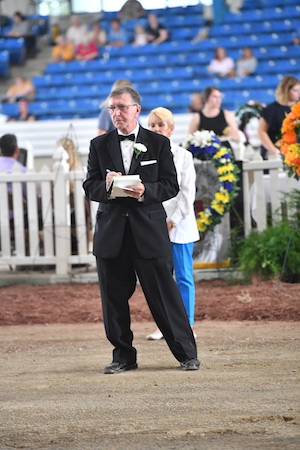
Sam Sorrell offers wisdom and experience
Fowler: Tell me about yourself, and your love for horses.
Sorrell: I retired last year. I have been a life-long Tennessee Walking Horse lover. I have been coming to the Celebration since 1966 … I got my judge’s license in 1980 … I had several people ask me to do it and I so I did. The more I did it, the more I liked it.
Fowler: You judged the Tri-County Anglers show after being hired as a Celebration judge. Did this present any interesting challenges in terms of scrutiny by exhibitors showing in front of you or other challenges?
Sorrell: Actually, on this year’s Celebration panel there are three of us who had shows after being named Celebration judges, which is somewhat an abnormality. I had contracted to do that show in February. All you want to do is go out there and follow rules and regulations and do the fairest job possible. One thing that is so unique about the walking horse is there are variations of the gait. Some are showier and some more old-time walker.
The great thing is that there is someone out there that likes your style of horse. Everyone has their favorite type of gait. People will scrutinize because they want to see what you like. A good judge is consistent. What people have to realize is that what one judge likes another doesn’t … I tell people each class is a new class. Horses rarely make the same show twice. A good judge will tie accordingly by what they see in front of him right now.
Fowler: What advice would you offer to first-time judges?
Sorrell: These judges have been asked to judge because they’re knowledgeable and fair. My advice to them would be not to worry about what others think. I’d tell them, “You are here for your qualifications so judge like you’re the only one there.”
Fowler: Do you think the current judging system is the best option?
Sorrell: The Olympic high-low system is the best system, yes, because it’s so fair. At the Celebration, you have five judges spread around the ring. On one side a horse may be great but on the other side he might mess up. This system will work it out to where the horse ends up where it needs to be.
Fowler: Describe the challenge of judging the Celebration and what it means to you.
Sorrell: I enjoy judging so much and the challenge of it. Why I love judging the Celebration so much is because it is the premier show. When any given class comes in, you really have to be paying attention and concentrate very hard. That 10th place ribbon to someone is the greatest thing in the world. To concentrate like that for all those days in a row is a challenge, but I love it.
Fowler: What are some things you’ve learned about judging the Celebration from an early assignment compared to the last one?
Sorrell: That first time you walk out there, that first Thursday night, it’s kind of overwhelming. You take a deep breath and think of all the greats…it’s a great privilege. You have to learn to just stay calm.
When you’re in the horse business you’re judging horses every day. Does this horse have good flesh, good shape, etc. You have to keep in your mind, as a judge, you know what you like. Stay calm.
I remember in 2005 something that stood out, and that I realized was so important, was the riders. They have to make a concerted effort to make sure a judge sees their horse. If a judge doesn’t see your horse your horse won’t get tied and that’s not the judge’s fault
Fowler: How do you prepare mentally and physically?
Sorrell: You do have to be in good shape, that’s for sure. I ride all the time and I exercise daily. Mentally, I go over the rules and go through the rulebook. I prepare a sheet for every horse show I judge. You might go from a ladies mares and geldings class to a country pleasure class. There are things that stand out in each division, so just to get my mind in order before each class I look over my notes on my cheat sheet. It helps me refocus.
Fowler: What makes you most qualified?
Sorrell: I am knowledgeable and I’m fair. I like to pick the best horse. Speed is very important. No one wants to go to a horse show until 2 or 3 a.m. Also, it’s important for the horses that you make decisions quickly. It’s so hot so this is for the benefit of both the horse and the rider. When I judge I judge very quickly. When I call them to the line-up I know who I’ve tied.
Fowler: What’s life like outside of horses and what are you looking forward to after the Celebration?
Sorrell: This fall I have a little trail mare that I’m going to start camping and trail riding with ... She’s young and I’m excited for that. I didn’t realize how big (trail riding) had gotten but I have some friends who went to South Dakota and Wyoming…it’s big ... I’m a very routine oriented person. I get up, feed horses, get on the elliptical, and ride. It’s important to stay fit because once you get out there in that big ring it’s a grind.
Fowler: Who was an early influence in your life and why?
Sorrell: Claude Graham was a major influence in Kentucky; he won Celebration in 1961 with The Major Wilson. My uncle was friends with him and would take me up there to let me watch him work horses and that was better than Disney World.
Fowler: What guides you in life each day?
Sorrell: Work hard, be dedicated, be fair and be good to people … and good things will come.
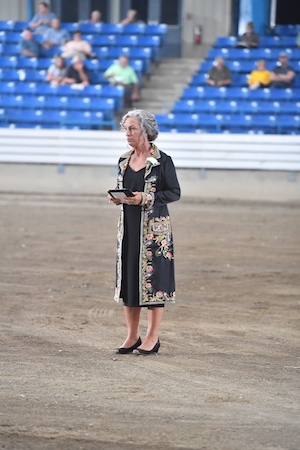
Leigh Stuart encourages riders to have fun
Fowler: Tell me about yourself.
Stuart: In short, I’m a mother, daughter, sister, and horse trainer. I was born and have stayed in Bowling Green for 56 years. My mom loved horses and we had walking horses in one barn and Saddlebreds in the other. Today, I train and have everything from country pleasure to performance horses. Instruction has been a huge part of my career.
Fowler: How did your journey in judging begin?
Stuart: I received my license in 1982. I was on a collegiate judging team at Western Kentucky University.
Fowler: Do you think there would be any benefit to having separate judging panels, one for pleasure and one for performance?
Stuart: I think I’m the only person on this year’s panel that was on a pleasure panel at the Celebration when they had one. With the training we do today, five judges in the Olympic high low system is probably the best system for this horse show. The more you judge the better you become. Once you start you get in a rhythm ... As a pleasure panel, there were nights where we only judged one class and that wasn’t good.
Fowler: How are you preparing for the show physically and mentally?
Stuart: I’m trying to get really, really organized. I’m a rules person. I’ve even been called Janet Reno before … People say we need to throw the rules away, and that’s not true. They are guidelines that help me prepare. I go over the class schedule multiple times before the show and star classes that I need to refresh on. I read rules for every class before the show. Physically, I think judging the show is perhaps easier than showing at it.
Fowler: How can the industry branch out and attract more newcomers?
Stuart: The more we can promote the horse and share all our horse can do the better. We need to educate people about all disciplines … I have seen more kids involved in different divisions this year than in many years. I think parents are realizing how much kids need to get out and get away from the computer. Our success starts with our kids.
Fowler: What makes you most qualified?
Stuart: Years of experience. Going back to the college days, where I was on the collegiate judging team, I learned a good system of judging … You learn what the ideal horse is for every division and then as those entries come in and you see them you compare them to the ideal standard for that division. This all goes back to college and is a great standard.
Fowler: What’s life like outside of horses?
Stuart: My job is my life. I own a 60-acre farm, I have cattle, and we raise hay. In the winter months, I have a little jewelry business, so that’s something people might not know about me.
Fowler: What is something that influenced you early in life that benefits you today?
Stuart: My best friend had Saddlebreds. If I have an area of expertise, it’s equitation. I got to go with my friend to the Shivelys to watch her ride. I think understanding the importance of equitation is greatly important. Equitation isn’t about being a pretty rider but it’s about being a great rider. It’s so important in every breed. Understanding why that makes a difference has been a huge influence in terms of how I present horses and riders.
Fowler: What advice would you give to exhibitors in today’s show world?
Stuart: Before one of my riders goes into the ring I always say have fun. I think we’ve lost focus and sportsmanship has gone out the window. I’m for great effort in being rewarded. I’m extremely competitive, but at the end of the day, if my kids and riders aren’t having fun I have to stop and say what am I doing wrong. I think the great trainers will say “You did a great job tonight.” Encourage riders rather than say that judge sucks. Stay positive and encouraging and have fun. Take a deep breath and try to enjoy. There’s no thrill in life like riding down the chute and making that turn. It’s thrilling.
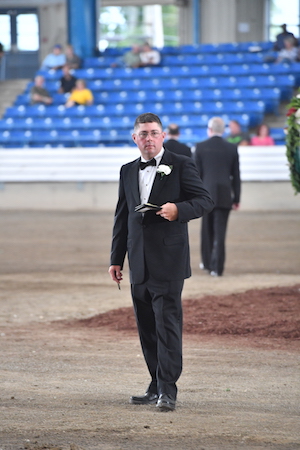
David Sisk feels confident about task at hand
Fowler: Tell me about yourself, family and what you do for a living.
Sisk: I live in Columbia, and married my wife Kim. We have three kids; Brady 1, Ethan, 7, and Lainey, 10. Kim and I have been married for 14 years and met through horse industry. I have a small dump trucking company in Columbia, Tennessee, where I was born and raised, that I run and manage. We also have a small farm with broodmares, hay and cattle. I went to the University of Mississippi and my degree is in business management.
Fowler: How long have you been a licensed judge and what led to you getting it?
Sisk: It was one of those things I always wanted to try. I had showed horses for years, and in 2011, I went out on a whim and said why not try it. I got licensed and I really enjoy it.
Fowler: You judged Lewisburg most recently, which was after you’d been hired as a Celebration judge. Did this impose any extra challenges or did you feel you were more closely scrutinized?
Sisk: Yes, you do feel more scrutinized. The way I look at it is I was there to judge Lewisburg, nothing else. The reason some people scrutinize is because people think you have a perception of their horse from that night. They’ll think, well, “If he likes my horse tonight I’m going to do well under him at the Celebration” or vice versa. But that’s not the case. The slate is wiped clean.
Fowler: What’s the most challenging aspect of judging the Celebration?
Sisk: It’s the most difficult assignment. I’ve judged the Celebration two times. It’s the most challenging because you’re going first place through tenth place for five days and 11 nights. It’s a grind. You have to be on your game at all times. You can’t sleep on the job so to speak. It’s the most important show our industry has and you have to be on the ball.
Fowler: Do you ever feel like you made a bad call and if so how do you recover from letting this bother you or interfere in your mental focus?
Sisk: Anyone who says they’ve never made a mistake is not telling the truth. As soon as a class is over you have to brush it off and move on or it will affect you the rest of the night. Mistakes will happen, but you have to look forward.
Fowler: Describe what your first impression was when you first judged the Celebration?
Sisk: My first impression was how big it is. You’re going in there and you know in the back of your mind you’re going to be crowing the world grand champion. You just have a great feeling of appreciation. It’s important going into the show to know the rules, step out there and mark what you see.
Fowler: What makes you most qualified?
Sisk: I think I’m the best judge there is. If you don’t think that about yourself you shouldn’t be out there. I know what I like and I don’t waiver on that. I know what kind of horse I like and I think that’s important for a judge to be confident and well-qualified. I know I’m confident in my judgment of a horse, and I’m not scared of that.
Fowler: Describe your thoughts on the make-up of this year’s panel.
Sisk: I think it’s a very diverse group. Everyone’s experienced but there’s a couple that don’t have Celebration experience, and they’ll do just fine. I think this is going to be a fun group to work with this year.
Fowler: What’s something about judging people might not realize?
Sisk: I wish everybody would do it one time. People don’t realize when you’re in center ring you only see what you see. The aspect from a judge’s standpoint is totally different than the outside looking in.
Fowler: What’s life like outside horses?
Sisk: I’m a family man. I stay busy with my kids; I coach baseball. I’m a family guy, and I’m always with my wife and kids. During the horse show, when the morning classes are over I’ll drive home for the afternoon just for that very reason, so I can spend time with them. My kids like coming to the show, too … They come for the ice cream.
Fowler: Who is someone who has influenced you in life and why?
Sisk: I guess probably my father. I respect him, what he’s taught me about being a good father, husband and person … I live my life trying to do what’s right. I try to treat people right and do the right thing … And I think this all applies to horses. Every time I’m out there I give everyone a fair shot. It’s just the right thing to do.
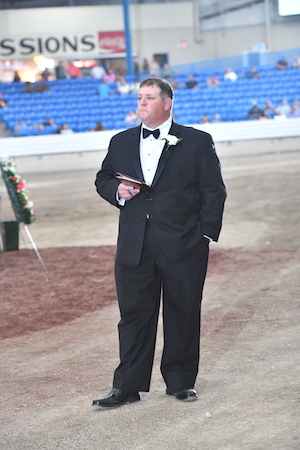
Ross Campbell ready for the challenge
Fowler: Tell me about yourself and how you got started as a horse trainer in Cullman, Alabama.
Campbell: I’m a trainer, and that’s all I’ve ever done. My dad had a barn in the early 1970s, and as I got older I knew that’s what I wanted to do. We mainly keep performance horses, but I don’t have a thing in the world against pleasure horses. We keep about 40 horses at any given time. I’m married to my wife Teresa, and we have two grown daughters, one who lives in Birmingham and the other in California.
Fowler: How did you feel when you received the call about judging this year’s Celebration for your first time?
Campbell: It’s an honor. It’s something I always wanted to do, and I may wish I hadn’t but we’ll see (laugh). You don’t get asked that often, so I was a little surprised. It was the middle of July when they called. Everybody kept saying I made the short list but you never know until you get that call.
Fowler: How long have you been licensed?
Campbell: I have been judging racking shows since the early 1990s and got my commissioned walking horse license after that, so I’ve been judging for about 25 years. I like the challenge of it, especially at the bigger shows. Anybody can judge a little show but you really have to work at it for the bigger ones.
Fowler: What was the last horse show judged prior the Celebration?
Campbell: I judged Pulaski. They hired me to judge Pulaski way back, in April or May maybe. Since I was hired for the Celebration, I probably could have gotten out of it but that’s not right for those people. They’d have to hustle to replace me. I just hit the door running and did it. A lot of people in the past have thought if they don’t get a good ribbon (at a show prior to the Celebration when a Celebration judge is officiating) then that means they won’t do well at the Celebration. That’s not right. Each class is independent from another. I especially treat classes that way because I know from being a trainer that these horses aren’t robots. Some nights they’re good and some nights they’re not.
Fowler: How would you describe the state of the industry right now?
Campbell: We’ve had a real good year. Horses look good and people are out looking and buying. Yearlings are high, so that’s always good, if you raise them.
Fowler: Describe your most difficult assignment.
Campbell: When you have a class with a lot of horses in it and 90 percent could win a class any given night and they are all doing what they’re supposed to do, it’s very difficult … You just have to narrow down the field the best you can and once you’ve done that to the best of your ability you have to be able to walk off and be OK with that decision. At shows like the Celebration, where the depth of quality is so great, narrowing down the field is the big challenge. I judged Tunica the year before last and I judged a novice amateur class with 20 in it and when they lined up we marked the cards and walked off. When they walked off we realized the first seven or eight had won the celebration that night. If you got eighth that night it didn’t mean your horse wasn’t good.
Fowler: What makes you qualified to judge the Celebration, in your words?
Campbell: You know, I’ve been doing this my whole life. I see the good and the bad every day. I think I can pick between the difference pretty easy. We show a lot and I don’t get to judge much but when I do I take it pretty seriously because most of the time I’m on the other end and I know it can go either way.
Fowler: Do you think the current judging system is best or would it be valid to explore other set ups to allow judges more breaks or to enable them to focus on their specialty, such as having a pleasure and performance panel again, or something different?
Campbell: When we get our license we have to do pleasure and performance, so we should be able to handle both. I think the days when we have morning and night classes will be tough, and then you factor in weather. But I think we can handle it all just fine.
Fowler: What classes are you most excited to judge?
Campbell: The last one is the big one of course. Everybody looks forward to that one. But the large pleasure classes probably are more challenging because they’ve gotten so good with these pleasure horses. Sometimes you put a bunch of good ones together and you have to get down to the tack, the attire, the line-up, how they back, all the little details. The pleasure horse people have gotten really good.
Fowler: How important is it for judges to move along quickly?
Campbell: Speed is important. You don’t want to be standing out there all night but on the other hand you want to get it right. If you make a boo boo you have to make it right, but you need to do it in a timely manner.
Fowler: What’s life like outside of horses?
Campbell: I like to hunt. My wife’s family lives in Florida and we go down there quite a bit and go out fishing and all that. Other than that, it’s horses.
Fowler: Who was an early influence in your life and why?
Campbell: My dad, Gerald. He gave me a good foundation to start with and we’ve been very lucky on the customer end of it as well. We have horses here now for customers that had horses with us when I was a kid. We have a lot of loyal people I’d say. He worked real hard for a lot of years. He still does a lot with broodmares and helps out where he can.
Fowler: What’s a driving principle in life you live by that can be applied to judging?
Campbell: To me it goes with judging or anything else. I do my best to be honest with people. Do I make mistakes? Yes, I do every day, but they’re honest mistakes. I just try to do the best I can.
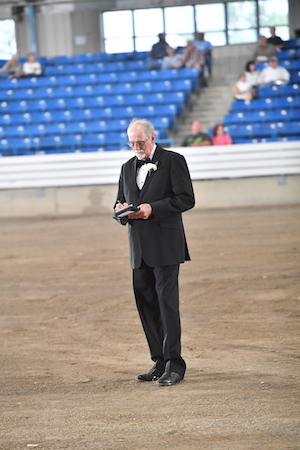
Mike Hilley offers broad perspective to panel
Fowler: How did you get started?
Hilley: I started working horses in Alabama when I was five or six. The last couple years I’ve been working for Mike Daniels in the construction business. I have two daughters and one son, none of which are involved in horses.
Fowler: Do you feel not being in the training business offers you a different perspective and if so why?
Hilley: I don’t have to worry about any conflicts or anything like that. I’m not in horse business anymore, but still judge quite a bit.
Fowler: How long have you been licensed to judge and what prompted this?
Hilley: It was just sort of a natural thing to do when I was working horses. I got licensed probably about 30 years ago. I enjoy it, but I also enjoyed training.
Fowler: How are you feeling going into your first Celebration judging assignment?
Hilley: It was an honor to be asked to do this. I feel privileged. I’ve judged big shows, such as Tunica, Mississippi and others, but never the Celebration. Everyone says it’s hard because of hours but I think it will be fun at same time … I don’t really see it as being added pressure though. I understand it is serous, but I’m trying to treat it like any other big show. I think the panel we have this year is great and I’m really looking forward to it.
Fowler: What has been your most difficult experience as a judge?
Hilley: They are all the same. The person you tie fifth wants that ribbon just as bad as the one who tied first. Part of it is that I’ve been there. I know how important it is to trainer and customer that they get a fair shake … I feel like I’m fair and pretty knowledgeable, that I’m good at what I do.
Fowler: Describe a common misconception people have about judging.
Hilley: A judge is having to place first through tenth and having to look at them all equally. In the stands, it’s different, at least it is for me. When I watch a class from the stands I watch it to enjoy, and that’s a big difference from watching a class as a judge.
Fowler: What class are you most excited about?
Hilley: I probably enjoy the two-year-old classes more than any other class because I enjoyed working the young horses. I enjoy watching the younger horses.
Fowler: Describe your thoughts on the industry right now.
Hilley: It went through a hard time seven or eight years ago, but the last couple years it seems to be stronger. Our horse has gone through a lot and it seems like everything that gets thrown at this horse just makes it come back stronger.
Fowler: What’s life like outside of horses?
Hilley: At my age you don’t have much fun (laugh). No, I enjoy fishing, floating the river with my wife, Gloria. She is probably a better rider than me. We haven’t ridden since I went into construction.
Fowler: Who is your greatest influence and why?
Hilley: My father had a big influence on what I did and what I do now. He passed away 20 years ago. His values, working around him is where I get my love.
Fowler: What is something in terms of how you live your life that you can apply to judging?
Hilley: I just try to be honest. My faith in Jesus gets me through a lot of things. I often ask myself, “What would he do?”